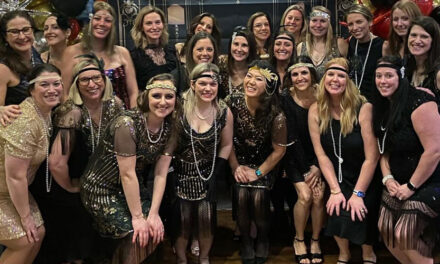Published in the April 4, 2018 edition
LYNNFIELD — The annual Town Election will be feature two contested races, including a three-way race for two seats on the School Committee.
The three candidates running for a three-year term on the School Committee are current chairman Tim Doyle, Ford Avenue resident Phil McQueen and Edgemere Road resident Kimberlee Kossover Hansen.
The Villager asked the three candidates to answer five questions. Following are their responses.
What skills do you have that make you the right candidate to serve on the School Committee?
Tim Doyle: Having a broad understanding of how the school district is structured and the ability to evaluate each decision relative to its impact on the entire district provides me with the skill to advocate for the resources necessary to ensure that all students receive a high quality educational experience.
Kimberlee Kossover Hansen: As a parent to a kindergartner and a preschooler, and a participant in a diverse set of community activities, I will have insight into what is happening on a daily basis in our schools. I am a professional, business minded woman who is personally invested in the education of our children for the next 15 years.
I will bring over 20 years of business experience and a unique skill set to the School Committee. I am an excellent negotiator and communicator, and have consistently demonstrated an authentic ability to establish rapport, build credibility, and cultivate lasting relationships. I thrive on challenges and I know how to get things done. My energy and sincere enthusiasm, along with my positive attitude and open mindedness for new ideas, have brought me much success in my career and in life.
Frequently recognized as a leader, motivator, mentor and coach by my management team and peers, you can be confident that I will strive to meet the best interests of all students across our district.
I will not only listen to concerns from members of the community, but I will also work to be proactive before issues become real problems. I will hold our town leaders, including the superintendent, accountable to the community by requesting appropriate and timely written responses to concerns raised by parents and members of the community. I am known for being persistent, and I will ensure promises to the community are kept by our elected officials.
In addition, I plan to attend a Charting the Course training program which is provided to all School Committee members in Massachusetts. I have familiarized myself with the Open Meeting Laws and reviewed the school budget from the past few years. I toured all of the schools with the superintendent, and met with each principal and our special education director. I am passionate about the future of Lynnfield Public Schools, and am excited for the opportunity to serve and work with the entire community.
Phil McQueen: I have a unique set of skills. I am an experienced educator, a good listener, a strong communicator, and I will not shy away from challenging questions and having difficult conversations. The combination of these factors make me the right candidate.
I want to bring my 20 years of education experience as a teacher, an evaluator, a contract negotiator, a professional development trainer and a curriculum and assessment writer to the table to best serve the students, parents and education professionals of our community. I am well versed in the current issues and concerns that face public education today, and will listen carefully to the concerns of all and work proactively to make our good school system even better.
I am very much in the trenches as both a parent and an educator. As the father of students at the elementary, middle and (next year) high school level in Lynnfield, I have a broad perspective on the issues and challenges faced on a daily basis in our schools. My wife, Deanna, is also an educator, a kindergarten teacher in Chelsea. Between us, we have a record of 40 years of commitment to public education and to all students. As the English Department chair at Lynn Classical with a wide range of educational and evaluative responsibilities, I know what the demands of modern education looks like from the inside out.
I will bring all of this to the table to best serve the needs of all stakeholders in the Lynnfield Public School system. A vote for me is a vote for experience, a vote for open communication, a vote for engagement, and a vote for advancement and excellence for all students in Lynnfield.
What would be your priorities if elected to the School Committee?
Kossover Hansen: I have reviewed the superintendent’s goals and district strategy from 2018, and am ready to provide input to the 2019 goals and district strategy, ensuring they encompass all target areas of concern, including:
1.) A proactive approach to addressing the imminent overcrowding in our schools over the next two to five years.
2.) A strategy to help the middle school improve its academic ranking.
3.) A comprehensive plan to potentially increase the special education budget, including identifying viable solutions to sustain the PREDS (Preschool Extended Day) program.
4.) I will work closely with the superintendent to continue to incorporate the principles of social-emotional learning and more physical activity into the curricula.
5.) Finally, I will be a strong voice for bringing parental concerns forward regarding the safety and security of our schools as well as what measures are being taken to combat bullying through education and prevention.
McQueen: My first priority if elected to the School Committee is to actively listen, and my agenda will be driven by what people tell me. Over the last few weeks as I have been campaigning, a number of issues have been brought up to me by parents, so these will be my first priorities. Concern about space in our schools and potential overcrowding is a big issue and a worry to many and something that needs to be acted upon now. School safety is also a huge issue for parents. A number of parents whose children receive special education services have various concerns that need to be examined. Social-emotional learning across all grade levels is also an issue that concerns parents. I will pursue all of these issues in a proactive and shared way and keep lines of communication open to all.
In addition to this, and from my perspective as an educator, the implementation of new curriculum programs across the board is something that needs to be continued, and built upon, through teams of teachers collaborating on vertical alignment from the elementary to the high school level to ensure that we get even better at supporting and strengthening instructional excellence and curriculum alignment.
Doyle: Advocate for funds on behalf of our staff and students so that the school district continues to provide significant educational opportunities in a healthy and safe environment.
How do you envision the SC would support the new space committee formed to evaluate school enrollment and space issues?
McQueen: My vision on working with the Space Committee is to be open, collaborative and pro-active. We need as much information as possible to make sensible and informed decisions on what to do about school enrollment and space issues. We need to look into the projected population increases over the next few years, particularly the ones associated with the new proposed property developments and the impact they will have on school enrollment.
It looks as though the elementary schools are pretty much full, so we need to come up with solutions to alleviate this issue. We need to think creatively, and outside the box, so that we can ensure small class sizes at all levels. Research shows that strong effective teachers and small classes lead to the best educational outcomes for students, so it goes without saying that these should be non-negotiables for our students in Lynnfield.
Doyle: I would expect the School Committee to respect the autonomy of the School Enrollment and Capacity Exploration Committee during their inquiry. I anticipate Superintendent Tremblay and her administrative leadership team will share with the committee the data they have collected and systems they have used to monitor the issue over her tenure.
Kossover Hansen: The School Committee representative on the new space committee should ensure timely feedback to the rest of the School Committee, superintendent and the community at large. The School Committee can provide historical trends to the space committee representative and information about what has been done in the past or in other districts to most efficiently accommodate student placement needs.
Another great source of data will come from the real estate market which will give insight into the increasing housing capacity in Lynnfield and how many additional children can be expected in each grade level over the next few years. According to census data there were about 150 more children under age five in 2016 than in 2014, which represents a 35 percent increase. At the same time, a sizable and growing percentage of our population is aging and potentially looking to downsize, which could bring in younger families. The space committee and School Committee should actively work together to seek possible solutions to address how these demographic trends will impact the town’s infrastructures in the coming years.
Source for Census Data: https://factfinder.census.gov/faces/tableservices/jsf/pages/productview.xhtml?src=CF.
What would be your approach to communication if elected to the SC?
Doyle: With the growth and reliance on social media, the committee will continue to explore the best means necessary to disseminate appropriate and relevant information in a timely manner.
Kossover Hansen: Communication between the superintendent, the School Committee and the community is a critical issue that can and should be improved immediately. In my personal experience attending School Committee meetings and in talking to other parents who have attended them over the years, the culture feels closed and fails to give community members, and even other members of the School Committee, adequate time to respond to proposals from the superintendent and the chairperson. I believe it is possible to encourage dialogue and feedback during these meetings, while still complying with the required meeting format. Furthermore, improved communication at meetings would be beneficial to students, parents and the community.
One of the superintendent’s goals is to increase communication with the parent community by seeking ways to improve public participation and engagement at School Committee meetings. I believe we can increase public participation and engagement, as well as transparency, by enabling two way communications and formalizing a process for addressing parents’ concerns.
If elected, I will further support this goal by exploring the possibility of holding smaller group forums to provide the opportunity for families to engage in more meaningful dialogue with the superintendent and members of the School Committee. In the meantime, I will take every opportunity to listen to parents and bring their concerns back to the School Committee. I am prepared to ask meaningful questions at meetings, so that the School Committee can provide information back to parents and taxpayers about decisions that are being made or considered.
McQueen: My vision for communication would also be to be open, collaborative and available. I want to hear from everyone: The schools, the parents, the students and address their concerns and needs and ideas. I want to work closely with the PTOs and support the enrichment that they provide our schools. It is important to communicate what is going on, and what the district’s plans for the future are in a pro-active way. No one benefits when communication is reactive, and scrambling towards damage limitation. Effective organizations need to be reflective, and thoughtful in their planning so that it doesn’t have to be quickly reactionary.
I am very excited to hear from all the stakeholders in the Lynnfield public school district so that I can serve the needs of all. At the end of the day, and indeed every day, we must strive to make our good schools even better and open communication with stakeholders is the foundation of improvement across all the schools.
The Chapter 70 program is the major program of state aid to public schools. The Massachusetts Foundation Budget Review Commission (FBRC), which was established by the State Legislature as part of the FY’16 state budget, issued a report in the fall of 2015 identifying two areas, employee health insurance and special education, where the Massachusetts Foundation Budget significantly understates the true cost of educating students in the commonwealth. In the wake of the town’s budget becoming more challenging going forward, do you believe the School Committee should take a more proactive role in the fight for Chapter 70 education aid reform? If so, what steps would you take to inform more residents about this systemic statewide issue?
Kossover Hansen: In January, Gov. Baker announced a $118 million increase in funding for Chapter 70 school aid. While the dollar amount sounds significant, it is actually lower than in recent years and is below inflation costs. This factor will leave many minimum aid communities like Lynnfield with less state funding. Ideally yes, we should continue to ask our state representatives to advocate for more funding for Lynnfield’s schools, however the School Committee could work to better manage the budget we already have.
Lynnfield’s school budget accounts for over half of town spending, and while spending has increased to bring in innovative programs, recently we have seen a slight dip in our rankings compared to similar towns around the state. The School Committee has the ability and the responsibility to ensure that taxpayer dollars are being spent wisely to improve outcomes for all students.
State funding issues, especially with the recent changes made by Gov. Baker, are complex, but it’s important for the community to be properly informed so we can all do our part to ensure Lynnfield is receiving the funding needed to support our schools. This again comes back to communication. Rather than having important discussions about school finances in a vacuum, the community should be involved and informed step by step. Our town administrator and state representatives play a key role in petitioning for our funding, and an informed community can help pressure these decision makers to provide Lynnfield with increased funding.
McQueen: Chapter 70 is not a competitive funding system, it is: “the commonwealth’s primary program for distributing its portion of K-12 public education funding to the state ‘s 328 local and regional school districts. The Chapter 70 formula aims to ensure that each school district has sufficient resources to provide an adequate education for all of its students, taking into account the ability of each local government to contribute. In short, the formula is designed to have an equalizing effect, with less wealthy districts receiving more state aid than wealthier ones (massbudget.org). Furthermore, the most recent competitive education funding program the Obama administration’s Race to the Top (RTTT), which grew out of the Bush administration’s No Child Left Behind (NCLB), ended in 2015. So, at the state and federal level, there is no money to fight for. Nevertheless, the Massachusetts Department of Elementary and Secondary education does have a number of grants that are available to school districts; however, of the 90 grants, most recently available, only 32 of those were of a competitive nature with most of the rest focused on adult education and Charter Schools. Of these 32, the Lynnfield School district would only be eligible to apply for four of them.
These particular grants are ones that could have been useful in Lynnfield as they were focused on digital connections, resource reallocation, safe and supportive schools and enhancing data use. So, yes I think Lynnfield should go after available sources of funding, but we need to be cognizant of the fact that there are not that many sources of funding. We need to look at the funding that we already have in the established budget, for example the $250,000 in the annual capital budget set aside for the school technology budget, and use it for its intended purpose.
In the past, the PTOs and the taxpayers have always been there for the schools, but we need to look to other sources of funding and possible business partnerships. The PTOs do an amazing job in funding enrichment programs in the schools and that should be their focus, not in covering seeming budget shortfalls.
Doyle: This issue is not unique or new. The school committee is a member of Massachusetts Association of School Committees and was a member of the now defunct Suburban Coalition, and each group recognizes the flaw in the statute. Our committee has always supported positions that encourage reform of the statute.
As our community’s budget becomes more restrictive due to the lack of new growth, I believe the relevance of the flaw in Chapter 70 will become part of the conversation.




